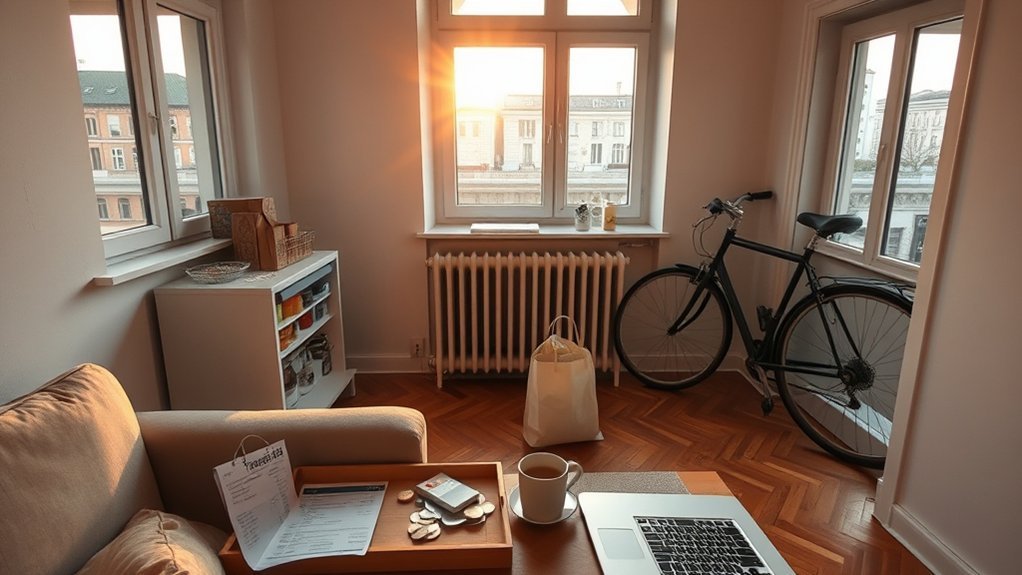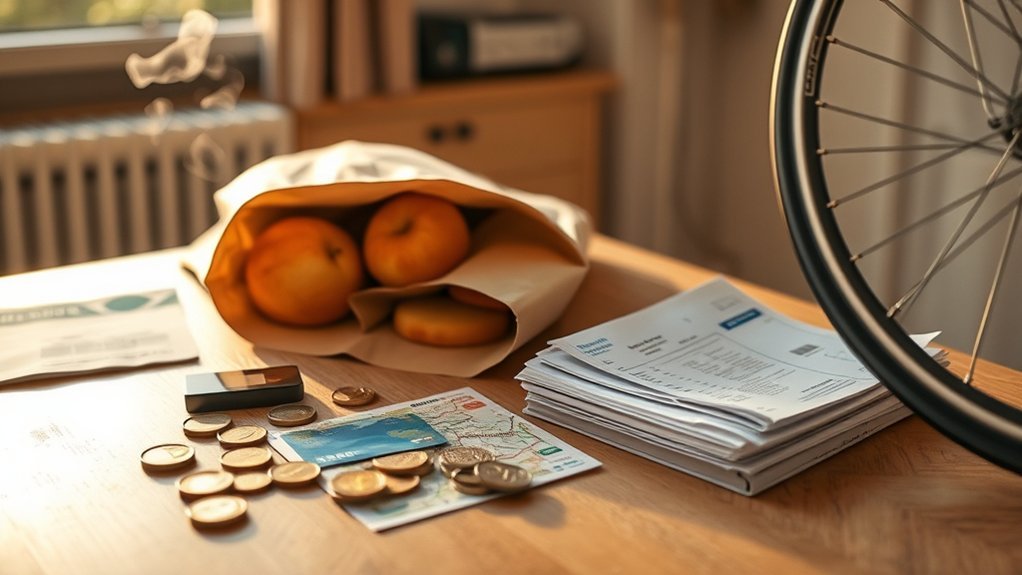You can expect to spend about €2,100 a month as a single person in Berlin to cover rent, groceries, public health insurance and utilities, while average net pay sits near €3,875 so you’ll have limited room to save. Rent is the biggest item: expect roughly €1,249 for a studio or €690 for a private room, with two‑bedrooms around €2,200. Groceries at discount chains run about €250 monthly. Keep reading for detailed breakdowns and saving tips.
Is Berlin an Expensive City to Live In?

While Berlin isn’t as pricey as Amsterdam, Paris or London, it’s not cheap either: a single person typically needs about €2,100/month to cover rent, groceries, insurance and utilities, and average net pay is roughly €3,875, so most residents can meet basics but have limited room to save.
You’ll find Berlin cost of living sits mid‑range: average rent drives budgets—general apartment rents ~€1,690, studios ~€1,249, private rooms ~€690—and differ widely by neighborhoods.
Your monthly expenses also include utilities and bills plus predictable small fees like the €18.36 ARD charge and ~€5 liability insurance.
Factor public transportation (€99 for a full pass; cheaper zone options €42–€59) and groceries and health insurance into fixed costs.
With a €3,875 net salary you can cover essentials, but rent pressure limits discretionary spending. Additionally, local market conditions can significantly influence overall expenses, just like in other major cities.
Compared to Western capitals affordability compared to Europe is favorable, yet you’ll feel cost differences versus smaller German cities when choosing where to live.
Monthly Budget for a Single Person

Having looked at overall costs and typical salaries, let’s break down what a single person actually spends each month in Berlin. You’ll need roughly €2,100/month to cover Berlin rent, groceries, public health insurance and other monthly expenses. Rent dominates: a studio apartment averages ≈ €1,249 (warmmiete noted) while a private room is about €690. Groceries run ~€250 if you shop discount chains. Public health insurance employee contribution is 7.3% of gross (employer matches); students pay ~€120–€140/month. Liability insurance is low-cost (~€5/month). Public transport monthly passes range €71.40 (student) to €99 (standard); single tickets ≈ €3.50–€3.80. Additionally, being aware of preventative measures can help you manage unexpected expenses effectively.
| Category | Typical monthly cost |
|---|---|
| Studio apartment (warmmiete) | €1,249 |
| Groceries | €250 |
| Public health insurance / liability | €120–€140 / €5 |
| Public transport | €71–€99 |
Use this as a baseline for personal adjustments to the cost of living.
Monthly Budget for a Family of Four

To plan realistically, expect a family of four in Berlin to need about €4,400 a month, with rent usually the single biggest line item.
You’ll typically spend around €2,200 on rent for a 2-bedroom apartment, roughly half your monthly cost. Groceries run about €800 for four, and leisure and entertainment add roughly €400. Childcare averages €195 per child, so budget €390 if you have two in kindergarten or preschool.
Factor in health insurance: dependents are generally covered under public health insurance at no extra premium, but you should confirm coverage details.
Recurring household fees include the ARD TV licence (~€18.36/month when averaged) and liability insurance (~€5/month per person), which together add modest fixed costs.
When you total these core items—rent, groceries, childcare, insurance, entertainment, and household fees—you’ll see how the €4,400 baseline forms a practical, data-driven monthly budget for a family of four in Berlin. Additionally, consider that compliance with regulatory requirements can influence overall living costs, especially regarding housing and insurance.
Rent and the Berlin Housing Market

Rent shapes almost everything about living in Berlin, and you should expect it to take the largest slice of your monthly budget—average apartment rents hover around €1,690, with studios near €1,249, one‑bedroom city‑centre averages about €1,167 (outside centre ≈ €886), and private rooms roughly €690; for a family a typical two‑bedroom runs about €2,200. The rental market is tight and fast‑moving, so you’ll prepare Mieterselbstauskunft, payslips, Schufa and ID and act quickly on listings. It’s essential to consider long-term cost-effectiveness when deciding on your living situation.
| Type | Avg (€) | Note |
|---|---|---|
| Studio | 1,249 | consider WG for savings |
| One‑bedroom | 1,167 | city centre vs outside |
| Two‑bedroom | 2,200 | family budgets |
Know warmmiete vs kaltmiete: if you pay kaltmiete add nebenkosten for heating, water, waste. To lower rent, search WG‑Gesucht/HousingAnywhere/ImmobilienScout24, target neighborhoods like Neukölln instead of Prenzlauer Berg, accept a flatshare (WG), or choose a smaller unit. These are practical, data‑driven tips.
Everyday Costs: Groceries, Transport and Insurance

Once you’ve locked in accommodation, plan for the day‑to‑day bills that really shape your monthly budget: expect about €250 for groceries if you shop discount chains like Lidl or Aldi (EDEKA/Rewe and organic stores cost noticeably more), a BVG monthly ticket at roughly €99 (single ~€3.50, 24‑hour €9.90, 7‑day €41.50; students ≈€71.40), and health insurance contributions around 7.3% of gross salary (employee share capped near €378/month; students €120–€140/month).
Beyond that, factor in the mandatory TV licence of €18.36/month and inexpensive private liability cover (~€5/month).
Utilities for an average 85 m² flat can add about €300 if not included in rent prices, and your internet bill will typically be €35–€45.
Altogether, these everyday costs push monthly costs higher than base rent: groceries, public-transport ticket, health insurance, utilities, TV licence and internet bill together form the predictable portion of your budget.
Additionally, consider budgeting for ongoing maintenance as it can help you manage any unexpected expenses related to your living situation.
Use discount supermarkets and a student ticket where eligible to trim expenses.
Frequently Asked Questions
How Much Does It Cost to Live in Berlin per Month?
You’ll pay about €2,100/month solo; costs vary by Budget neighborhoods, Student discounts, Groceries breakdown, Public transport, Utility averages, Healthcare costs, Internet options, Leisure expenses, Second hand shopping, and Seasonal variations. Plan accordingly.
How Much Do You Need to Live Comfortably in Berlin?
You’ll need about €2,100–€3,500 monthly to live comfortably in Berlin, depending on neighborhood vibe, transport options, cultural events, seasonal costs, language barriers, healthcare access, work life balance, co working spaces, local groceries, leisure activities.
Is 1000 Euros Enough for a Month in Berlin?
No — you’ll struggle: average non‑rent costs often hit €750–€1,000. Use budget travel tips, shared apartments, student discounts, part time jobs, bike/public transport, cut monthly groceries/utilility bills, pick cheap neighborhoods, save emergency savings, learn German.
Is It Cheaper to Live in Germany or the USA?
Generally, Germany’s cheaper for everyday living, but it depends: you’ll weigh Healthcare differences, Tax systems, Education costs, Public transport, Groceries comparison, Housing markets, Utility expenses, Childcare affordability, Entertainment pricing and Salaries comparison.
Conclusion
You can live in Berlin without breaking the bank if you plan carefully and know where your money goes. Expect roughly €1,200–€1,800 monthly for a single person and €3,000–€4,500 for a family of four, with rent often the largest slice of the pie. Track groceries, transport, utilities and insurance, compare neighborhoods, and prioritize housing versus lifestyle to keep your budget realistic and flexible.


